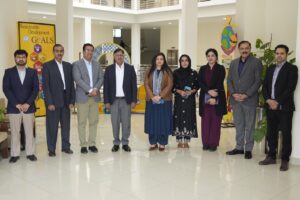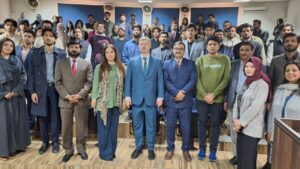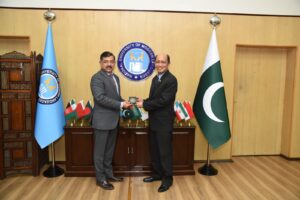ISSI Session with Mission Heads of African Countries

Islamabad, The Gulf Observer: The Centre for Afghanistan, Middle East and Africa – CAMEA at the Institute of Strategic Studies Islamabad – ISSI organized an In-House session with Heads of Mission of African countries in Islamabad. Director General ISSI Ambassador Sohail Mahmood led the ISSI side.
African Envoys shared their thoughts on the level of mutual cooperation and underscored the desire for deeper collaboration in diverse fields including political, economic and people-to-people exchanges
The distinguished participants included: H.E. Mohammed Karmoune, Dean of the African Corps and Ambassador of Morocco; H.E. Mthuthuzeli Madikiza, High Commissioner of the Republic of South Africa; H.E. Salih Mohammed Ahmed Mohamed Siddig, Ambassador of Sudan; H.E. Ms. M. Nyambura Kamau, High Commissioner of Kenya; H.E. Mr. Rashid Ally Soobadar, High Commissioner of Mauritius; H.E. Mr. Mohammed Bello Abioye, High Commissioner of Nigeria; and Mr. Shirwa Abdullahi Ibrahim, Charge d’ Affaires of Somalia.
Ambassador Sohail Mahmood shared the historical perspective on Pakistan-Africa relations and highlighted the main contours of Pakistan’s ‘Engage Africa’ policy
During the meeting, views were exchanged on the myriad dimensions of Pakistan-Africa relations.

The African Envoys shared their thoughts on the level of mutual cooperation and underscored the desire for deeper collaboration in diverse fields including political, economic and people-to-people exchanges.
It was agreed upon to maintain regular mutual dialogue, facilitate interface with the private sector and strengthen linkages with academic institutions and think-tanks
Director General ISSI Ambassador Sohail Mahmood shared a historical perspective on Pakistan-Africa relations and highlighted the main contours of Pakistan’s ‘Engage Africa’ policy. In this context, he noted the practical steps taken to expand Pakistan’s diplomatic footprint in Africa and deepen its economic engagement with the Continent. He added that Pakistan’s policy was further driven by the pivot to geo-economics.
Areas of mutual cooperation were identified including prospects for increased trade and investment as well as opportunities in the wake of African Continental Free Trade Area (AfCFTA). It was agreed to maintain regular mutual dialogue, facilitate interface with the private sector, and strengthen linkages with academic institutions and think-tanks.


